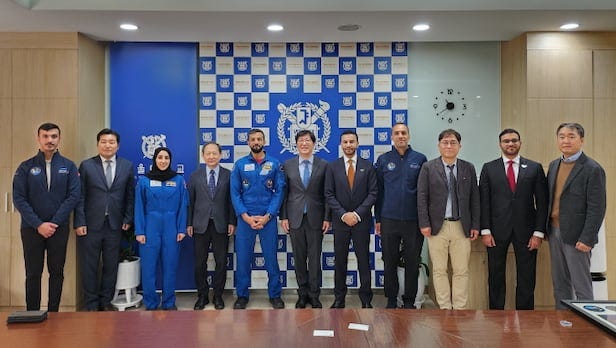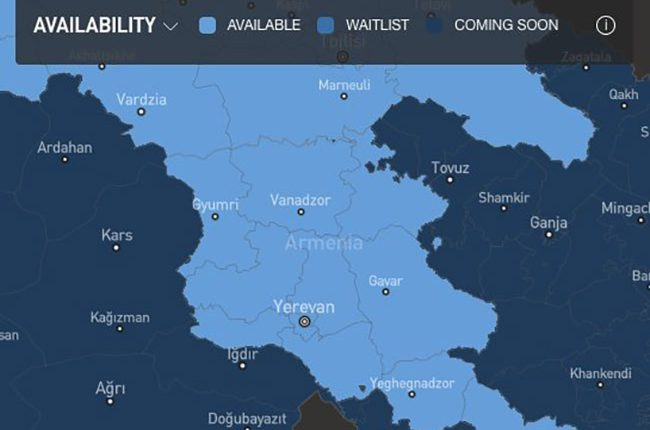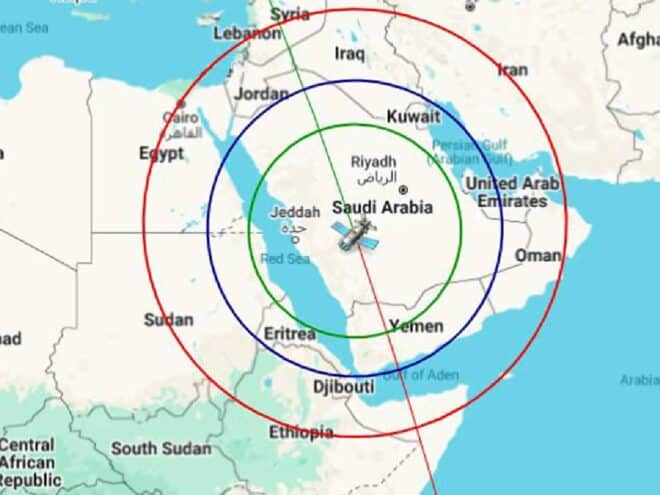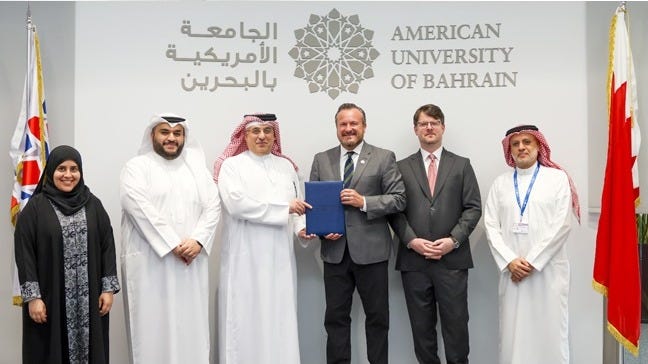Middle East Space Roundup: 24 to 30 March 2025
A summary of all the space news in the Greater Middle East over the past week, brought to you by AzurX
Eid Mubarak!
The team at Middle East Space Monitor wishes a blessed and joyous Eid al-Fitr to all those celebrating.
The following are the major space developments in the Greater Middle East region tracked by Middle East Space Monitor over the past week:
Neo Space Group at AIX 2025, 8-10 April
As the satellite-enabled In-Flight Connectivity (IFC) sector continues to evolve, few organizations are as poised to shape its future as Neo Space Group (NSG). At Aero Interiors Expo (AIX) 2025 in Hamburg, Germany, from 8 to 10 April 2025, Saudi Arabia’s national space champion NSG will showcase its bold vision for the next generation of IFC satellite communications. AIX is the professional platform where airlines, designers, engineers, specifiers, and manufacturers come together to share, collaborate, and find practical and innovative solutions. Please visit Neo Space Group at AIX 2025 at stand 4C32.
UAE Space Developments
Report: UAE’s EDGE Group in Talks With Thales Alenia Space on AI for Satellite Operations
The UAE’s EDGE Group is advancing negotiations with Thales Alenia Space on a series of memoranda of understanding (MoUs) focused on technology transfer and the integration of artificial intelligence into satellite systems, marking a strategic move to bolster the UAE’s sovereign space capabilities according to Tactical Report. The talks, ongoing since June 2024, have entered an advanced phase, with both parties aligning on key areas such as AI-powered satellite operations, mission automation, geospatial military analytics, and space domain awareness. A core objective is the seamless incorporation of AI-driven automation into current and future UAE satellite programs, alongside enhancements in real-time space threat detection. While significant technical understandings have been reached, outstanding issues remain, particularly regarding the scope of technology transfer and the UAE’s operational autonomy over AI systems post-deployment. A final agreement is expected by late 2025 or early 2026. This initiative supports the UAE’s National Space Strategy 2030 and underscores EDGE’s growing role in developing indigenous, AI-enhanced space infrastructure.

UAE’s Sultan Al Neyadi Leads Delegation for Space Talks With South Korea’s Seoul National University
During a high-level visit to Seoul National University’s College of Engineering, UAE astronaut and Minister of Youth Dr. Sultan Al Neyadi, accompanied by fellow astronaut Nora Al Matrooshi and senior UAE space officials, met with Korean counterparts to advance UAE–South Korea collaboration in space research and education. The meeting included discussions on establishing active cooperative frameworks between Seoul National University and the UAE, as both countries pursue deeper engagement in aerospace innovation.

UAE’s TII at Forefront of Developing Secure and Resilient Satellite Systems Using AI, Quantum Cryptography, and Zero-Trust Architectures
At IDEX 2025 in Abu Dhabi, Dr. Shreekant Thakkar, Chief Researcher at the UAE’s Technology Innovation Institute (TII), underscored how artificial intelligence (AI), quantum cryptography, and zero-trust architectures are redefining the resilience and security of satellite and space-based systems. His team at TII’s Secure Systems Research Center is advancing real-time satellite situational awareness through AI-driven onboard data processing, anomaly detection, and adaptive communication constellations to counteract cyber and electronic threats. Emphasizing secure autonomy, Thakkar detailed how zero-trust principles and post-quantum cryptographic solutions are being integrated across TII’s platforms to harden satellite operations against increasingly sophisticated adversaries. Notably, TII’s work spans from secure mobile applications to swarm-capable UAVs and high-performance mission computers, such as the Saluki flight controller and Perceptra GPS-less navigation system, developed in partnership with ADASI. These innovations demonstrate the UAE’s strategic investment in sovereign, AI-enhanced space and aerospace technologies, positioning TII as a global leader in space security and dual-use system innovation.
UAE’s Madari Space Signs MoU With Thales Alenia Space to Develop Space-Based Data Centres
The UAE’s Madari Space has signed a memorandum of understanding with Thales Alenia Space to collaborate on the development of space-based data centers, marking a significant milestone in the company's strategic growth. The partnership grants Madari access to Thales Alenia’s advanced technological expertise and integration within the broader European space ecosystem, with a shared focus on accelerating innovation, enhancing interoperability, and advancing the emerging frontier of orbital data infrastructure. This collaboration positions both companies at the forefront of a new paradigm in secure, resilient, and low-latency space-based computing solutions.
Opinion: UAE’s Space Gains Demand Updated Regulatory Frameworks and International Cooperation
In Gulf News, Chris Redmond writes that since the dawn of the space age, technological advancement has remained the cornerstone of human space exploration, evolving from Cold War-era geopolitical competition to today’s dynamic commercial space race. From Sputnik and Apollo to SpaceX's reusable rockets and Starship system, the sector has consistently pushed engineering boundaries to enable cost-effective, high-frequency missions. NASA’s collaboration with SpaceX for the Artemis III lunar lander underscores the central role of innovation in achieving the next generation of human exploration milestones. Similarly, the UAE's successful Emirates Mars Mission, astronaut program, and lunar rover initiatives, along with Saudi Arabia’s growing satellite and communications agenda, highlight the Middle East’s emergence as a regional hub for space technology. As companies like Blue Origin and Virgin Galactic contribute new capabilities to the commercial space sector, the ongoing convergence of robotics, AI, propulsion, and advanced materials continues to redefine what is technically possible. Yet, these gains also demand updated regulatory frameworks and international cooperation to ensure sustainable and secure operations beyond Earth. In this era, space remains the ultimate proving ground for innovation, resilience, and strategic technological leadership.
Egypt Space News

Egypt’s Aqmaar Space Signs MoU With Egyptian Space Agency for Satellite Manufacturing
In a milestone for Egypt's growing space sector, the Egyptian Space Agency and Aqmaar Space Technology Company signed a strategic cooperation protocol aimed at advancing domestic satellite manufacturing capabilities. The agreement, endorsed by ESA CEO Dr. Sherif Sedky and Aqmaar CEO Eng. Ahmed Nassar, will leverage the agency’s advanced testing infrastructure to support Aqmaar’s development of satellites for IoT, communications, and Earth observation services. The collaboration emphasizes integration between research institutions and private enterprise, facilitating knowledge exchange, satellite operations, and frequency coordination. As Egypt’s first private company to manufacture and operate satellites for local and global markets, Aqmaar’s partnership with the national agency reinforces Egypt’s digital transformation strategy and positions the country as a competitive player in regional satellite manufacturing and innovation.
Egypt and Jordan Hold Space Cooperation Talks
Dr. Sherif Sedky, CEO of the Egyptian Space Agency, welcomed Eng. Muamar Hadadin, Director General of Jordan’s Royal Jordanian Geographic Centre, to discuss bilateral cooperation in space technology and remote sensing. The visit underscored Egypt’s commitment to regional collaboration by showcasing the agency’s capabilities, including its satellite assembly and integration facilities, EgyptSat-2 control systems, and the advanced Space Academy. The delegation also toured the only satellite dynamics environment simulator in Africa and the Middle East, highlighting Egypt’s regional leadership in space systems testing and training. The meeting reinforced efforts to align space technology with sustainable development goals and foster specialized talent across Arab countries. As a symbolic gesture of appreciation and partnership, Dr. Sedky presented the agency’s commemorative shield to Eng. Hadadin, affirming the importance of cross-border collaboration ahead of Egypt’s hosting of New Space Africa 2025.
Egypt’s NileSat Reports Excellent Financial Results for 2024
NileSat, Egypt’s leading satellite operator, reported a robust 31.83% surge in net profits for 2024, reaching $57.7 million amid a challenging regional market environment. Announced during its General Assembly, the company attributed this performance to strategic cost rationalization, with operating expenses dropping by 13.35% to $58.2 million and gross operating profits rising by 23.85% to $43 million. Despite a marginal 0.67% dip in revenues to $101.1 million, NileSat successfully maintained its customer base across its coverage areas. A key driver of profit growth was a 46.9% increase in interest income from investments in treasury bills and government bonds, totaling $33.4 million. Shareholders’ equity also saw a 5.34% increase, reaching $656.1 million. Reflecting this strong financial performance, the company approved a dividend distribution of $0.55 per share, reinforcing its financial stability and commitment to shareholder returns within the satellite communications sector.
Starlink’s Regional Rollout
Oman Approves Operator License for Starlink’s Satellite Broadband Services
Oman's Telecommunications Regulatory Authority has officially approved Starlink Muscat to launch satellite broadband services across the Sultanate, marking a pivotal development in the country’s digital transformation agenda. Operating under a Class 1 license granted by Royal Decree No. 42/2023, Starlink will deliver high-speed, low-latency internet via its low-Earth orbit satellite constellation, reaching underserved and remote areas with speeds of up to 100 Mbps. Beyond enhancing rural connectivity, the service is expected to improve competition among telecom operators, elevate service quality, and bolster critical sectors such as energy, mining, tourism, and agriculture. Additionally, Starlink will enable reliable backhaul solutions for telecom towers in difficult terrains, positioning satellite broadband as a key enabler of Oman’s nationwide connectivity ambitions. Starlink’s expansion in Oman forms part of its broader regional ambitions, with licensing efforts underway or completed in the UAE, Saudi Arabia, Kuwait, Bahrain, and Jordan, signaling a wider push to establish satellite internet as a cornerstone of digital infrastructure across the Middle East.

Armenia Approves Starlink SATCOM Services, Engaging With Other Providers
Starlink has officially launched its satellite internet services in Armenia, a milestone hailed by Minister of High-Tech Industry Mkhitar Hayrapetyan as transformative for the country’s digital infrastructure. Meanwhile, Armenia is continuing its negotiations with Starlink to establish satellite internet services in the country, following the approval of two radio frequency applications by the Public Services Regulatory Commission in December 2024. Deputy Minister of High-Tech Industry Gevorg Meliksetyan confirmed that legal and regulatory frameworks are currently being finalized to facilitate Starlink’s operations, positioning satellite connectivity as a crucial alternative in regions where fiber-optic infrastructure is economically unviable. Meliksetyan also noted that Armenia is engaging with additional satellite communications providers to diversify options. In parallel, the Ministry, in coordination with the PSRC, is advancing efforts to deploy a national 5G network, signaling a broader commitment to strengthening Armenia’s digital infrastructure and connectivity landscape.
Azerbaijan Announces Start of Starlink Satellite Internet Services
Starlink has officially launched its global satellite communication services in Azerbaijan, marking a significant step in the country's digital connectivity landscape. The announcement, made via the company's official account on platform X, confirms that Starlink’s high-speed, low-latency internet is now accessible across Azerbaijan. This deployment is expected to enhance internet accessibility, particularly in remote and underserved regions, supporting broader national efforts to bridge the digital divide and stimulate innovation across key sectors.
Saudi Arabia Space Developments
Saudi Arabia’s Falak for Space Science & Research to Conduct Experiment on Human Eye on SpaceX’s FRAM-2 Mission
Falak for Space Science and Research, a nonprofit organization in Saudi Arabia, is set to launch the Kingdom’s first space-based biomedical experiment focused on the human eye aboard SpaceX’s upcoming FRAM2 mission. The study will examine how microgravity affects the eye’s microbiome, specifically investigating bacterial behavior, antibiotic resistance, and biofilm formation—critical factors for astronaut health during long-duration missions. Led by Falak CEO Dr. Ayoub Al Subaihi and supported by Saudi scientists including ophthalmologist Dr. Selwa Al Hazzaa, the mission represents a strategic step in Saudi Arabia’s space R&D ambitions and underscores the role of nonprofit institutions in advancing applied space science. The research also positions the Kingdom at the forefront of ocular microbiome studies in space, potentially influencing both extraterrestrial and terrestrial medical treatments.

Starlink Satellite Enters Atmosphere Over Saudi Arabia, Underscoring Space Debris Threat
The recent atmospheric re-entry of Starlink 5314, observed as a striking fireball over multiple cities in Saudi Arabia, including Riyadh, Jeddah, and Madinah, underscores the growing visibility—and implications—of satellite deorbiting events tied to the expanding global constellation network. Captured on 27 March 2025 by observers such as Khaled Al Baridi and verified by the International Astronomy Center, the event highlights the operational lifecycle of low Earth orbit (LEO) satellites like those deployed by SpaceX. While the satellite disintegrated almost entirely upon re-entry with minimal debris risk, the incident reinforces the pressing need for sustainable space traffic management and end-of-life planning as satellite constellations scale, raising broader considerations around orbital debris mitigation and atmospheric re-entry protocols.
Other Regional Space News
Report: Qatar’s Barzan Holdings and Thales Alenia Space in Talks on SAR, Optical Satellites
Thales Alenia Space has submitted a comprehensive satellite proposal to Qatar’s Barzan Holdings, offering advanced variants of the Syracuse IV and Proteus Neo platforms tailored for maritime and aerospace surveillance, according to Tactical Report. These dual-payload satellites incorporate COSMO-SkyMed second generation synthetic aperture radar (SAR) and Pleiades Neo optical sensors to deliver high-resolution, all-weather imaging optimized for Gulf-specific conditions like sandstorms and heat distortion. Equipped with onboard AI-enhanced processing and laser-based data relays from the Alenia Space Data Highway, the systems promise real-time threat detection and maritime domain awareness. The offer includes integrated ELINT and SIGINT capabilities for airspace monitoring, enhancing Qatar’s ability to track low-observable aircraft and UAVs, detect spoofed AIS signals, and analyze anomalous patterns. The proposed satellites would form a cornerstone of Qatar’s broader AI-driven surveillance architecture, with joint test deployment anticipated by 2026 and parallel discussions underway on a full maritime surveillance system with Thales Group.

Bahrain Space Agency Signs MoU With American University of Bahrain for Space Science Education
The Bahrain Space Agency (formerly the National Space Science Agency)has signed a memorandum of understanding with the American University of Bahrain (AUBH) to enhance collaboration in higher education, scientific research, and innovation in space science. This strategic partnership, signed by Dr. Mohammed Ibrahim Al Aseeri and Dr. Bradley J. Cook, aligns with Bahrain’s Economic Vision 2030 by fostering a knowledge-based economy and encouraging youth engagement in emerging scientific fields. The agreement outlines joint initiatives including student programs, specialized workshops, field visits, and collaborative research efforts aimed at developing technical expertise and strengthening Bahrain’s national space capabilities through academic-industry integration.
Iraqi Space Engineer, Diana Al Sindi, to Participate in Qatar’s BilAraby Summit
Iraqi aerospace engineer Diana Al Sindi, recognized as the first NASA engineer of Iraqi descent, will participate in the upcoming BilAraby Summit in Doha, Qatar, on 19 to 20 April 2025, where she will present on "Bringing Space Closer to Our World." Her session will spotlight scientific innovation and space technology, reflecting her contributions to rocket development and satellite engineering. The BilAraby Summit, which celebrates Arabic language and culture, is expected to convene over 500 influential figures from across the Middle East to discuss key topics such as artificial intelligence, environmental sustainability, and space exploration—positioning Al Sindi’s participation as a bridge between regional identity and global scientific progress.
Türkiye’s Turkcell Partners With U.S.’ Lynk Global for D2D LEO SATCOM Demonstration
Lynk Global has successfully demonstrated its patented direct-to-device (D2D) satellite connectivity technology in Türkiye through a partnership with leading mobile network operator Turkcell. The field tests, conducted near Konya using standard mobile phones and Turkcell’s terrestrial spectrum, enabled seamless SMS, voice, and data services via Lynk’s low Earth orbit (LEO) satellites without requiring specialized hardware. This collaboration aims to expand mobile coverage and enhance network resilience in rural and disaster-prone areas. Lynk, which holds FCC approval to operate a 10-satellite LEO constellation for GSM and LTE support globally, currently maintains partnerships with 50 mobile network operators across 60 countries. Its recent strategic funding and integration agreement with SES further strengthens its global reach. The Türkiye trial aligns with a broader industry trend, as U.S. operators like Verizon, Charter, and Comcast begin integrating Non-Terrestrial Network (NTN) services via partners such as Skylo to offer emergency satellite messaging for commercial smartphones, marking a transformative shift in global mobile connectivity infrastructure.
India’s Instrumental Role in Supporting Islamic Countries’ Space Programs
India’s upcoming launch of two Indonesian satellites via the Indian Space Research Organisation (ISRO) continues a decade-long space partnership and highlights New Delhi’s growing role as a trusted space collaborator for Muslim-majority countries. Through its cost-effective launch capabilities and technological reliability—evident in record-setting missions like Chandrayaan-3 and the PSLV-C37 multi-satellite deployment—India has cemented its reputation as a key enabler of space access for the Global South. Between 2015 and 2025, ISRO launched over 430 foreign satellites, with many originating from Islamic countries such as Indonesia, UAE, Malaysia, Nigeria, and Egypt. Beyond launches, India has supported partners like Brunei, Nigeria, and Kuwait in building ground infrastructure, satellite systems, and human capital via training and MoUs. Egypt, with ambitions for regional space leadership, has deepened collaboration with India following President El-Sisi’s 2023 visit, while Oman has requested Indian support in setting up a ground station and developing remote sensing capabilities. These partnerships underscore ISRO’s dual mission of advancing sustainable development and strengthening India’s geopolitical outreach through space diplomacy.
U.S. Views Iran’s Latest Space Launches as Pathway to Developing Intercontinental Ballistic Missiles
The 2025 USSTRATCOM posture statement underscores growing U.S. concern over Iran’s space launch vehicle (SLV) program, particularly the two-stage Simorgh rocket, which shares significant technical overlap with intercontinental ballistic missile (ICBM) development. While Iran claims its space program is intended for peaceful satellite deployment, the U.S. defense community increasingly views these launches as dual-use activities that could shorten the timeline to an operational ICBM capability. The Simorgh and other SLVs—deriving components from medium-range ballistic missile platforms like the Shahab-3—have demonstrated incremental advances in staging, propulsion, and guidance systems. In parallel, the Islamic Revolutionary Guard Corps (IRGC) has achieved greater launch success with its solid-fuel Qased rocket, suggesting a maturing military space capability. Although Iran has not tested a missile with an ICBM-range exceeding 5,500 km, U.S. intelligence agencies and defense officials warn that the technological gap is narrowing, driven more by political will than technical limitations. These developments, coupled with Iran’s refusal to accept constraints on long-range missile testing and the expiration of UN Resolution 2231 language, heighten proliferation concerns. Iran’s SLV activities are being closely monitored, as each launch may serve as both a space mission and a step toward strategic weapons development, reinforcing the view that its space program could become a cover for future ICBM deployment.
Morocco and India Deepen Space and Satellite Cooperation
Morocco is emerging as a strategic partner for India in space, defense, and advanced manufacturing, with Ambassador Mohamed Maliki underscoring the country’s role as a gateway for Indian companies—especially in sectors like space exploration and satellite cooperation. In a recent interview, Maliki emphasized Morocco's free trade access to major global markets and its modern infrastructure, which positions the country as an ideal platform for Indian firms expanding in high-tech fields. He noted that bilateral relations, elevated to a strategic partnership following King Mohammed VI’s 2015 visit to New Delhi, now encompass space cooperation among other critical sectors such as cybersecurity and defense. The momentum is evidenced by Indian defense manufacturer Tata Advanced Systems setting up its first overseas plant in Morocco and the deepening interest in aerospace-related opportunities, aligned with Morocco's ambitions to bolster its industrial sovereignty. This strategic convergence includes potential joint initiatives in satellite technologies and space-based applications, offering a platform for India to extend its space technology footprint into Africa, while supporting Morocco’s broader goal of becoming a regional aerospace hub.
Upcoming Events
CABSAT to Take Place From 13 to 15 May 2025 at Dubai World Trade Centre
Set to take place from 13 to 15 May 2025, at the Dubai World Trade Centre, CABSAT and Integrate Middle East will serve as pivotal platforms for the broadcast, satellite, media, and Pro AV industries, showcasing over 450 exhibitors and attracting 18,000 attendees. Celebrating its 31st edition, CABSAT will highlight key themes of Creativity, Connectivity, and Consciousness, featuring a robust Content Congress with 150+ speakers addressing topics such as AI in media and the rise of Arab cinema. Co-located Integrate Middle East, the region’s sole Pro AV-dedicated event, will spotlight innovations in IoT, AI, digital signage, and immersive technologies across education, retail, and entertainment. The convergence of these events is expected to catalyze cross-sector collaboration amid a rapidly expanding regional Pro AV market, projected to reach $22.7 million by 2030. With global entertainment revenues forecasted to hit $2.6 trillion in 2025, the events will offer strategic opportunities for industry professionals to forge partnerships, explore emerging technologies, and drive innovation in content creation and digital experience delivery.
Be sure to catch up with space activities in the region in the next edition of Middle East Space Monitor’s space roundup!









